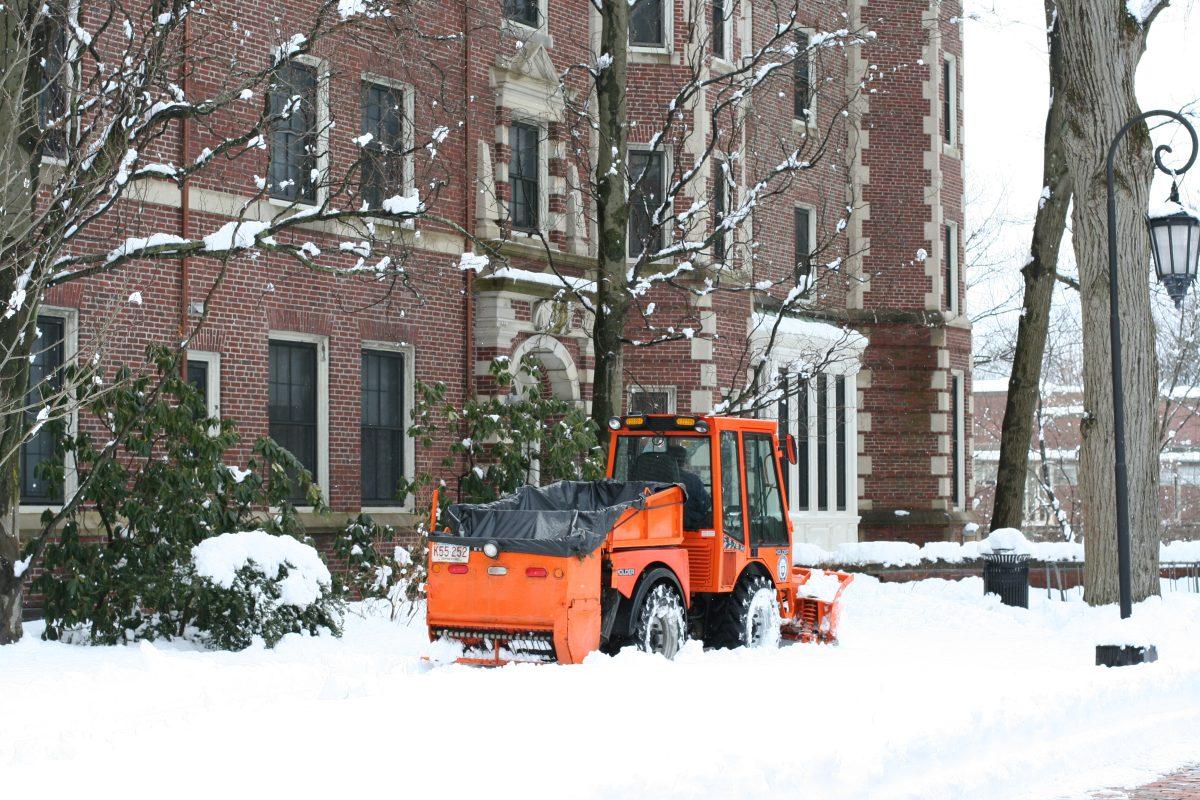This winter, Wellesley has frequently seen temperatures dropping below freezing. On March 4, Wellesley experienced a high of 38 degrees and a low of 24 degrees. Overnight, the town of Wellesley was enveloped into 8-12 inches of snow. The previous night, the National Weather Service posted a winter storm warning, cautioning people to be wary of slippery roads and snow falling from rooftops. Around 5:30 a.m., many cities across Massachusetts experienced a power outage, which led to nearly 5,000 people without power.
The snowstorm brought with it about a foot of snow. The weather forecast the prior day had not predicted nearly as much snow. Due to the unpredictable effects of snow and its quick removal by the city authorities and Wellesley College administration, the school declared a snow delay on March 4. The snow delay was announced early on Monday morning at 5:49 a.m. via email to the entire Wellesley College community.
Early in the morning, the school facilities commenced work on shoveling the roads and pedestrian ways to ensure the safe travel of students. The administration announced a delay of the school day by more than two hours. According to the email, daily activities would commence at 10:30 a.m., while classes would start at 11:20. Usually, early morning classes start at 8:30 a.m.. Due to this delay, classes at 8:30, 8:55, and 9:55 were cancelled. Several professors were not able to make their first classes, due to the impending slippery roads which had not been plowed properly yet.
The surrounding schools around Wellesley all had a different approach to the storm. Harvard University, Massachusetts Institute of Technology, and Boston University refrained from closing or delaying classes. Instead, they all announced that class, public transport, and all the school-specific schedules would run according to their routine schedule. Presumably, this was due to the snow dwindling off at around 8 a.m., which allowed students to go to their regularly scheduled classes in the morning.
On the other hand, Babson College and Olin College of Engineering opted to close school for the day. All classes, regularly scheduled events, and activities were postponed or cancelled indefinitely. The administration of Babson provided their students with a list of activities, via Twitter that would help them enjoy their snow day to the fullest. The list included stocking up on supplies, reading up on a paper about the monetary value of investing in snow, taking aesthetically pleasing photos of the snow, or taking a trip to Wellesley College to enjoy the frozen Lake Waban, a truly pleasing sight on the cold, dull Monday morning.
Students at Wellesley were not as fortunate. Even after the delay some professors were impeded in their arrival to Wellesley due to the poor conditions and plowing of the road. Many areas in and around Boston advised their citizens to stay off the streets in order to let the authorities efficiently shovel the snow of the roads. Due to this, public schools in Boston and the surrounding areas were closed for the day. The storm led to a closing of all public schools in Wellesley as well, due to the slippery road conditions.
“I went to bed quite stressed out about assignments, not knowing what was going to happen, and generally in the mindset that I had to get up much earlier than usual so I could get to class on time,” said Liz Pelletier ’22. The early delay announcement was sent out to students at 5:49 a.m., a time when almost all students are asleep. It is not quite clear why the administration waited until so early in the morning to announce the delay to students. On the other hand, this news was also well received by students who saw it as an opportunity to sleep longer or get more work done. “My class was later in the day, so I was generally unaffected by the announcement,” said Esther Choe ’22.
Due to the cancellation of some classes and activities, to keep up with the semester schedules, professors had to heavily adjust their syllabi in order to keep up with the semester schedules. Undoubtedly, due to the different reactions of colleges to the snowstorm, this effect of the snow was not found on campuses where classes went on as normally scheduled.






